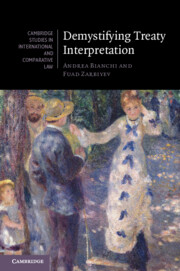Book contents
- Demystifying Treaty Interpretation
- Cambridge Studies in International and Comparative Law: 188
- Demystifying Treaty Interpretation
- Copyright page
- Contents
- Figures
- Preface
- Abbreviations
- 1 The Province of the Rules of Treaty Interpretation
- 2 The Interpreter’s Self
- 3 The Genealogy of the Contemporary Regime of Treaty Interpretation
- 4 Textualism
- 5 Intentionalism
- 6 What’s the Purpose of ‘Object and Purpose’?
- 7 Supplementary Means
- 8 The Magic of Systemic Integration
- 9 Inferential Reasoning and Its Consequences
- 10 Time and Treaty Interpretation
- 11 Text, Author, and Interpretive Control
- 12 Power, Persuasion, and Authority
- Annex Vienna Convention on the Law of Treaties 1969
- Index
- Cambridge Studies in International and Comparative Law
7 - Supplementary Means
A Dangerous Supplement?
Published online by Cambridge University Press: 07 March 2024
- Demystifying Treaty Interpretation
- Cambridge Studies in International and Comparative Law: 188
- Demystifying Treaty Interpretation
- Copyright page
- Contents
- Figures
- Preface
- Abbreviations
- 1 The Province of the Rules of Treaty Interpretation
- 2 The Interpreter’s Self
- 3 The Genealogy of the Contemporary Regime of Treaty Interpretation
- 4 Textualism
- 5 Intentionalism
- 6 What’s the Purpose of ‘Object and Purpose’?
- 7 Supplementary Means
- 8 The Magic of Systemic Integration
- 9 Inferential Reasoning and Its Consequences
- 10 Time and Treaty Interpretation
- 11 Text, Author, and Interpretive Control
- 12 Power, Persuasion, and Authority
- Annex Vienna Convention on the Law of Treaties 1969
- Index
- Cambridge Studies in International and Comparative Law
Summary
Building on Derrida’s celebrated analysis of the term ‘supplement’, this chapter investigates the fundamental ambivalence of supplementary means of treaty interpretation. While the general philosophy of the Vienna Convention interpretive regime rests on the assumption of a hierarchy between the primary means set forth in Article 31 of the Vienna Convention and the supplementary means of Article 32, qualifying certain means as supplementary presumes that the primary interpretive means are somewhat lacking and in need of a complement. The chapter also focuses on the ‘danger’ of such supplement that has been highlighted in practice, namely, that supplementary means themselves need to be interpreted before they can be used in an interpretive inquiry, reinforcing the larger point made in the book that it is impossible to get an unmediated access to any signified. The chapter argues that since supplementary means are not comprehensively listed in the treaty interpretation regime, a virtually endless number of materials can be made relevant in treaty interpretation discourse through the channel of supplementary means.
Keywords
- Type
- Chapter
- Information
- Demystifying Treaty Interpretation , pp. 142 - 156Publisher: Cambridge University PressPrint publication year: 2024

